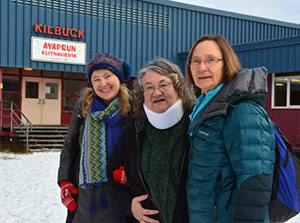WIDA Researchers Meet with Alaskan Native Educators
December 9, 2014

From left to right, WIDA researcher Paula White, WIDA Featured Educator Gayle Miller and WIDA researcher Rosalie Grant visit th
As part of a new initiative at WIDA to study the ways the organization can serve American Indian communities, WIDA researchers Rosalie Grant and Paula White traveled to Alaska for the 2014 National Indian Education Association (NIEA) Convention and to meet with educators working in schools that primarily serve Alaska’s American Indian population. Both Grant and White received WCER Professional Development grants to attend and participate in the NIEA.
The convention, which took place Oct. 15-18 in Anchorage, is one of the largest gatherings of American educators working on behalf of educational excellence, opportunity, and equity for American Indian, Alaska Native, and Native Hawaiian students. Together with David O’Connor, the American Indian Studies Program Education Consultant for the Wisconsin Department of Public Instruction, Grant and White gave a presentation at the conference titled “Building Collaborative Teams to Support Successful American Indian English Language Learners.”
While in Alaska, Grant and White visited the Alaska Native Cultural Charter School, a K-8 school in Anchorage offering a curriculum focused on Alaska Native culture. They also flew from Anchorage to Bethel, Alaska, to meet with WIDA Featured Educator Gayle Miller, the director of academic programs in the Lower Kuskokwim School District. The district is the size of Ohio and has a population of approximately 6,000, composed mostly of Alaskan Native students. Over the past four years, Miller has helped to implement a dual language Yup’ik/English program throughout the district.
Grant and White accompanied Miller on a visit to Tuntutuliak, a village of 400 Yup’ik Eskimos located north of the Bering Sea. This in-depth look at how the dual language program functions will help WIDA work with American Indian populations in ways that honor their communities, cultures, and native languages, Grant said.
Grant said she expected the visit to inform WIDA’s new initiative to form a potential research alliance with American Indian communities throughout the United States with the goal of advancing the linguistic and academic achievement of American Indian English Language Learners.


